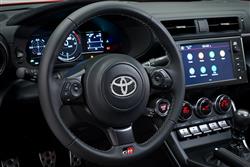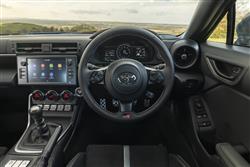Toyota GR86 - ABC Leasing
How will you view?
This is a sample, showing 30 seconds of each section.
THRILL SEEKER(some text hidden)
By Jonathan Crouch
Ten Second Review word count: 78
If you thought involving affordable sports cars belonged back in history, then you'll find Toyota's GR86 a welcome breath of fresh air. This latest car isn't much faster than its much loved GT86 predecessor but the suspension's stiffer, the steering's sharper and it's been made a little smarter, both inside and out. Otherwise, things are as before. Developed and desired by enthusiasts, the GR86 remains a benchmark in the compact coupe sector, a master class in driving dynamics.
Background word count: 289
For too long, enthusiasts have believed what the car makers have told them. That they needed more power, more grip, more fancy intervening electronics. That argument looks good on paper, but can often be curiously unsatisfying out on the road. If that's been your experience in buying an affordable and enthusiast-orientated but practical sports car, then you might agree that it's time to go back to basics. That's is exactly what Toyota did when back in 2012 it launched what was known in Japan as the 'Hachiroku' model, which translates as 'Eight, Six' in Japanese. We knew it as the GT86. Four factors governed its development: light weight, modest normally aspirated power, rear wheel drive and narrow tyres. Lap times, the engineers decided, were unimportant. What mattered here was driving enjoyment. You might have forgotten just how much of a heritage affordable Toyota sportscars have in providing that, from the tiny S800 of 1962 to the GT2000 late that decade, the Celica of the '70's and the mid-engined MR2 of the '80's and 90's. The GT86 has proved to be a worthy successor to those cars, but there's always room for improvement and now it's time for the next chapter in this model line, the GR86. The change of letter designates the development involvement of Toyota's motorsport division Gazoo Racing, the engineers who bought you the GR Supra and the GR Yaris. As with the old GT86, this GR model is been produced as part of a joint venture with Subaru - it's even built at Subaru's Ota plant. This time round, there won't be a Subaru version of this design sold in the UK, which should help Toyota sales of this design, which weren't stellar last time round.
Driving Experience word count: 277
They knew what sports cars were back in the Fifties. Not a lot of power. Not a lot of grip. And an awful lot of fun. If you see that as the classic automotive era, then it may be that you're not completely up to date with the quality of performance machines you'll find in the time you live in. Some of them are supercars - but not all. Take Toyota's GT86, which sold between 2012 and 2020. Here's its like-minded successor, the GR86. The headline change is the increase in size of an engine that's still a Subaru-developed Boxer four-cylinder powerplant, but now a larger one, capacity raised from 2.0 to 2.4-litres. There's 20% more pulling power and you can access it earlier in the rev range. Output rises by 34bhp to 230bhp and the engine note (enhanced by the cabin speakers) is now much more involving. Despite the bigger powerplant, there's hardly any change in weight, ride height is 10mm lower and the suspension's stiffer. Plus there's a shorter throw for the 6-speed manual gearbox. It's all good. What else? Well there's still a paddleshift auto gearbox option. And on top variants, you get grippy Michelin Pilot Sport 4 performance tyres. A Torsen limited-slip differential gives reassuring traction when cornering. And the new electric power steering system has a 13.5:1 ratio and requires just 2.5 turns of GR86's three-spoke steering wheel to move from lock to lock, giving easy manoeuvrability. 62mph from rest takes 6.3s for the manual (it's 6.9s for the automatic) - think around a second quicker than the previous GT86. Top speed is 140mph for the manual and 134mph for the automatic.
Pictures (High res disabled)

.jpg)

.jpg)
.jpg)
.jpg)
.jpg)
.jpg)
.jpg)
.jpg)
.jpg)

Scoring
Category: Compact Car
| Performance | |
| Handling | |
| Comfort | |
| Space | |
| Styling | |
| Build | |
| Value | |
| Equipment | |
| Economy | 80% |
| Depreciation | 80% |
| Insurance | 50% |
| Total | 71% |